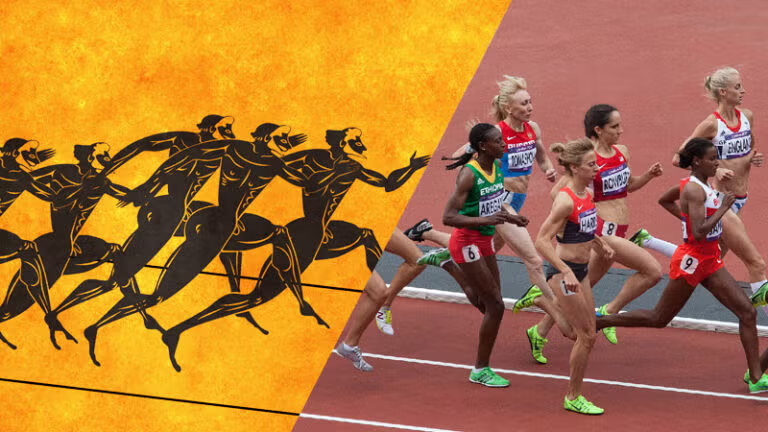Sports have always served as a universal language that transcends borders, cultures, and ideologies. From the Olympic Games of ancient Greece to the FIFA World Cup of modern times, international sports events have captivated audiences and created lasting memories. These events go beyond the realm of physical competition—they foster unity, ignite patriotism, and reflect the evolution of human society. In this article, we explore the rich history of major international sports events, their origins, evolution, and cultural significance.
The Ancient Origins of International Sports
The Ancient Olympic Games

The earliest known major international sports event was the Ancient Olympic Games, held in Olympia, Greece, as far back as 776 BCE. These games honored the god Zeus and included events like running, wrestling, boxing, and chariot racing.
Panhellenic Games
Besides the Olympics, other games like the Pythian, Nemean, and Isthmian Games were held in ancient Greece, drawing participants from various city-states.
The Revival of the Olympics in the Modern Era

Baron Pierre de Coubertin and the IOC
The modern Olympic Games were revived in 1896 in Athens by Baron Pierre de Coubertin. His vision was to promote international peace and cooperation through sports.
Growth and Globalization
From a modest event with 14 countries in 1896, the Olympics have grown into a global spectacle involving over 200 nations, with both Summer and Winter Games.
FIFA World Cup: The Pinnacle of Football

Origins and Early Tournaments
The first FIFA World Cup was held in 1930 in Uruguay. Organized by the Fédération Internationale de Football Association (FIFA), it featured just 13 teams.
Global Expansion
The tournament expanded over the decades to include 32 teams (and more in future editions), becoming the most watched sports event globally, with billions tuning in.
Cultural Significance
The World Cup is more than a tournament—it’s a cultural celebration. Nations unite behind their teams, and the event has become a platform for geopolitical messages, equality campaigns, and human rights awareness.
The Commonwealth Games
Origin and Development
Initially called the British Empire Games, the Commonwealth Games began in 1930. It now includes athletes from 54 countries, promoting friendly competition among Commonwealth nations.
Unique Features
The Games are known for including parasports events alongside able-bodied competitions, reflecting inclusivity and diversity.
The Asian Games
History and Importance
First held in 1951 in New Delhi, the Asian Games bring together athletes from across the Asian continent. Governed by the Olympic Council of Asia, it is second in scale only to the Olympics.
Showcasing Regional Strength
The Games are a vital platform for emerging sports powers in Asia and contribute to regional cooperation.
The UEFA European Championship (Euro)
Background
The UEFA Euro was first held in 1960. Organized by the Union of European Football Associations, it is the premier football competition for European national teams.
Popularity
Though regional, the Euro enjoys global viewership and often features football’s top stars and dramatic rivalries.
Copa América
South America’s Premier Football Tournament
Copa América is the oldest international football competition, first held in 1916. It features the continent’s football giants, including Brazil, Argentina, and Uruguay.
Cultural Legacy
The tournament plays a central role in South American identity and football history, with many legendary players gracing its pitch.
The Olympic Winter Games

A Snowy Celebration
Established in 1924 in Chamonix, France, the Winter Olympics focus on ice and snow sports like skiing, ice hockey, and figure skating.
Growing Appeal
Though initially less popular than the Summer Games, the Winter Olympics have gained prominence, especially in countries with cold climates.
The Paralympic Games
Empowering Athletes with Disabilities
The Paralympic Games began in 1960 in Rome and have grown into a major international event showcasing the talents of athletes with physical disabilities.
Promoting Inclusion
The Games challenge stereotypes and promote accessibility and equality in sports.
The Youth Olympic Games
Fostering Young Talent
Started in 2010 (Summer) and 2012 (Winter), these Games are designed to inspire youth participation in sports and educate them on Olympic values.
Unique Elements
The event includes cultural and educational programs in addition to athletic competition, fostering global citizenship among young athletes.
The Role of Sports Events in Global Culture
Unifying Nations
Sports events bring people together in celebration, even amidst political or social divides. They foster a shared human experience.
Reflecting Societal Changes
From boycotts and protests to record-breaking achievements by women and minorities, international sports events often mirror societal transformations.
Economic and Political Impact
Host countries invest billions to showcase their infrastructure and culture. While there are economic benefits, these events can also stir controversies over cost, politics, and human rights.
Also Read : How To Improve Your Paddleboarding Skills Like A Pro
Conclusion
Major international sports events are far more than just games. They are deeply woven into the fabric of human culture, history, and progress. From ancient Greece to modern global broadcasts, these events unite the world, celebrate excellence, and promote shared values of peace, respect, and determination. As sports continue to evolve, so too will the legacy of these iconic gatherings.
FAQs
1. What was the first international sports event?
The Ancient Olympic Games, first recorded in 776 BCE, are considered the first major international sports event.
2. When did the modern Olympics begin?
The modern Olympic Games began in 1896 in Athens, Greece.
3. Which is the most-watched international sports event?
The FIFA World Cup holds the record for the highest global viewership among all sports events.
4. Are there international events for disabled athletes?
Yes, the Paralympic Games are the largest international sporting event for athletes with disabilities.
5. How often are the Olympic Games held?
Both Summer and Winter Olympics are held every four years, staggered so that one set occurs every two years.
